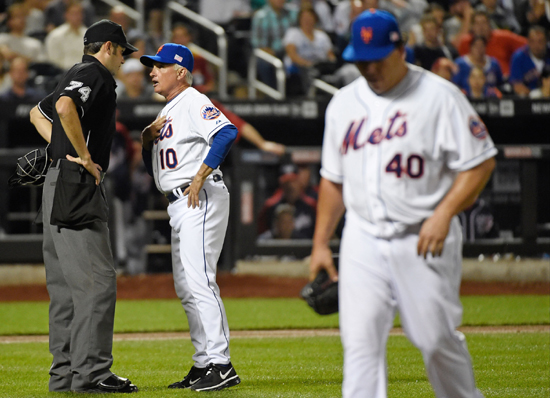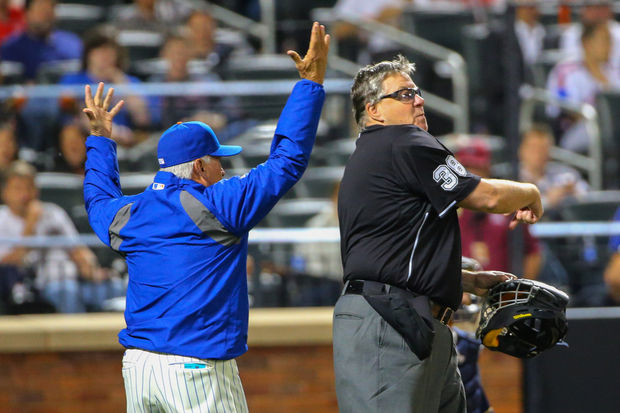
Pythagorean Win Percentage is an interesting formula. It’s transparent and supremely logical as metrics go. A close cousin to the Pythagorean Theorem, it is essentially a means to predict how many wins a team should accumulate by calculating runs scored squared over runs scored squared plus runs allowed squared.
In 2014 the Mets’ Pythagorean Win% was .5088. When multiplied by 162 you get the number of games the Mets should have won, 82.4. Last year’s Mets should have had a winning record if you go by how many runs they scored and how many they allowed. They were in fact the only team with a positive run differential (+11) that did not have a winning record. They fell just behind the Cardinals in win% and were 14th in baseball in runs allowed per game (right behind the Dodgers) at 3.81. The only teams with positive run differentials who did not make the playoffs were Toronto, Cleveland, and Seattle, who were a combined 24 games over .500. The Mets were the only team in the National League with a positive run differential who did not make the playoffs.
According to these measures the Mets should have been on the cusp of contention, especially considering that most basic of performance indicators, runs scored vs. runs allowed. And yet they weren’t, they finished 17 games back and 4 games under .500. They were, in a sense, the opposite of the 2013 Orioles who won a ton of one-run games while occasionally getting blown out. The Mets lost a bunch of close contests while winning their share of blow-outs. In 2014, the Mets scored 3.88 runs per game while allowing 3.81 runs, that is a recipe for a winning record, or, it should be … only it wasn’t.
Why?
If you look at BaseRuns, which is the number of runs a team should have scored given their component offensive statistics, the Mets in 2014 should have scored 3.77 runs per game while allowing 4.03 runs with a -43 RDif, which is pretty awful. So you can certainly put some of the blame for the Mets record on the offense, but in the end, there’s no way around that bottom line +11 run differential which unlike numerical hypotheticals, actually occurred.
The Mets were not very good in one run games at 26 W and 29 L. Both the Mets and the Braves had similar difficulties in this sense, both plagued by ineffective offensive output, both struggled in 1 run games … But the picture that emerges for the Mets is that of a team that couldn’t consistently win the close ones and which featured a “feast or famine” attack.
Why were the Mets able to score on some nights and not on others? You’d presume that at some point an objective analysis of matchups would have taken place by our sabermetrically gifted front office right? Lineups that sometimes clicked and sometimes did not would certainly be suspect. Lineups that flew in the face of the notion that you play the hot hand were the norm more often than not. All the while the Mets were routinely stifled in the late innings, only occasionally mounting a come-from-behind victory. Surely some of this has to fall on the shoulders of the manager does it not? He does make up the lineup card? He decides who will pinch-hit? It was Terry Collins who managed the bullpen and decided who to bring in as a late inning replacement with one of his patented clockwork double switches?

The Mets’ performance in the late innings and in close contests essentially negated a formula that should have produced a winning record, yet Terry Collins eludes any responsibility for his peculiar brand of late inning permutations and his oddly predictable substitutions.
You might say the Mets were bad in the clutch but you’d be wrong … the Mets actually had pretty decent clutch metrics. All signs point to a poorly managed club that should have won a bunch more games given their talent and performance levels … and, sadly, those of us who followed the team closely know the frustration of this failure well.
The good news is that the Mets, with even marginal improvements in their ability to score runs, should win more games. Wright and Granderson are almost bound to improve on their 2014 numbers given career norms, and the addition of Cuddyer should bring up run totals in the aggregate.
It shouldn’t take much to vault this team into contention. But when you consider how last year’s team was arguably on the cusp of contention itself, sunk by suspect managerial choices and poorly conceived lineups, you have to wonder how much these less than overwhelming improvements will factor in the grand scheme. At times it was hard to watch the workings of a manager who went beyond the ineffectual and actually appeared to inhibit any kind of rhythm or momentum with his mind boggling playing time allocations.
In Scott Gray’s biography, The Mind of Bill James, How a Complete Outsider Changed Baseball, Gray notes that there are two recurring motifs in James’ abstracts:
“That poorly run organizations leave promising young players on the bench in favor of established mediocrities and, ‘tend to project their weaknesses onto their best players, and ultimately will dwell not on what the player can do, but on what he can’t.'”
I haven’t come across a quote that better illustrates the failure and frustration of a 2014 Mets team that could have been, should have been, more than the sum of its weaknesses.
















